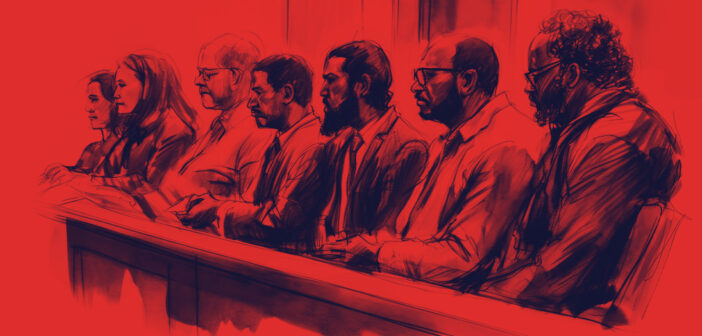“Jury Duty? UGH!”
if you’ve received one of those documents in the mail, you probably called your lawyer buddy immediately to ask how you could get out of it. While most people dread being summoned for jury duty, it should be considered an honor to participate.
Citizens of the United States have a few mandatory civic duties – jury service is one of them. It is a way for people to be part of the judicial process. In Michigan, a person is eligible to serve as a juror if they are:
- 18 years or older
- A United States citizen
- A resident of the county or district of the court calling for service
- Able to communicate in English
- Physically and mentally capable of performing service
- Without a felony conviction prior to service
With several high-profile trials recently in the national news, I thought some information about jury selection would be of interest. The following is an explanation of the process.
For a trial of any case in which a defendant is charged with a felony, 14 jurors must be chosen. Twelve jurors will ultimately decide the outcome; two will be excused at the end of the trial and put on standby as alternates, in case another juror must be absent due to an emergency.1 During jury selection, the process of asking potential jurors questions, either general or related to the specific case, is called voir dire.2 For trial lawyers, the goal of voir dire is to ensure that no one on the jury harbors a bias that could affect the outcome of the case. We have all seen TV shows and movies with a slick defense attorney who asks jurors questions about bumper stickers or what magazines they subscribe to. When determining someone’s suitability to serve on a jury, this is worthless information.
In a capital case – one in which the crime is punishable by up to life in prison – both the prosecution and defense teams can excuse up to 12 potential jurors for any reason.3 These are called peremptory challenges. An attorney can excuse any number of jurors for cause.4 “For cause” means there is a very good reason why a person would not be fit to sit on the jury, such as a medical condition, extreme financial hardship from missing work during the course of the trial, or bias toward one party. For example, the defense attorney may use a peremptory challenge to exclude a potential juror whose family member was the victim of a similar crime.
The peremptory challenges are an attorney’s tool for shaping the jury; when dismissing a juror with a preempt, he or she does not have to provide any reason why. It might be because the juror gave the attorney a dirty look, said something she didn’t like during voir dire, or maybe the attorney just didn’t like the shirt the juror was wearing. Generally, a juror can be excused if the attorney feels that he or she would not be a good juror for their side.
When I am picking a jury, I care about potential jurors knowing and understanding three concepts:
- Burden of Proof,
- Presumption of Innocence, and
- Reasonable Doubt.
If I can get a jury that understands these three concepts, I’m off to a good start in trial.

BURDEN OF PROOF
I am a criminal defense attorney. I need the jury to understand that I have zero obligation to prove my client’s innocence and that the burden of proof rests solely with the government. I tell every jury that I could literally fall asleep at the counsel table5 and not ask a single question6 and technically, I would not be doing anything wrong – because it is the government that has the burden of proving their case against the defendant beyond a reasonable doubt.
PRESUMPTION OF INNOCENCE
We have heard this phrase for our entire lives and it is still hard to grasp. It’s human nature to think that where there is smoke, there is fire. That is, if the defendant is charged with a crime, he must be guilty. This is a significant hurdle for any defense attorney to overcome. Jurors will say they understand that a defendant is presumed to be innocent, and I will ask them if they see a man pulled over on the side of the road, his hands on the hood of his car and being patted down by police officers, do they think, “Hmmm – I wonder what he is presumed innocent of?”7 The answer is: of course not. If I can get the jury to understand that the trial starts with the presumption that the defendant is innocent and the prosecutor has to prove their guilt, again, I’m off to a good start.
REASONABLE DOUBT
The burden of a prosecutor is to prove their case beyond a reasonable doubt.8 The legal definition of “reasonable doubt” is a mess – it’s hard to follow and it never makes sense.9 If I am being honest, it took me about ten years to figure out how to properly explain this to a jury.10 Essentially, it means that if you have a doubt about what happened and that doubt is reasonable, you must find the defendant not guilty.11
Any trial lawyer who claims they know how to “pick a good jury” is lying. There are obviously other things that a lawyer will talk to a jury about during selection; but one who can get them to understand these three concepts and remember them throughout the entire trial will have chosen a jury that is fit for duty.
1. I always feel bad for jurors who sit through an entire trial and then are not involved in the verdict.
2. French for “speak the truth.”
3. Unless the reason for the dismissal is on the basis of race, ethnicity or gender.
4. Excuses for cause do need approval from the judge; preempts do not.
5. Note: I do not fall asleep at the counsel table.
6. Another note: I definitely ask questions.
7. I wish I could remember what attorney I stole this idea from.
8. Back to Burden of Proof.
9. I will spare you the full definition; your eyes would fall out of your head if you had to read it.
10. For real.
11. Civil cases where only money is involved carry a different burden of proof. That’s a preponderance of the evidence, basically 50% plus one.














